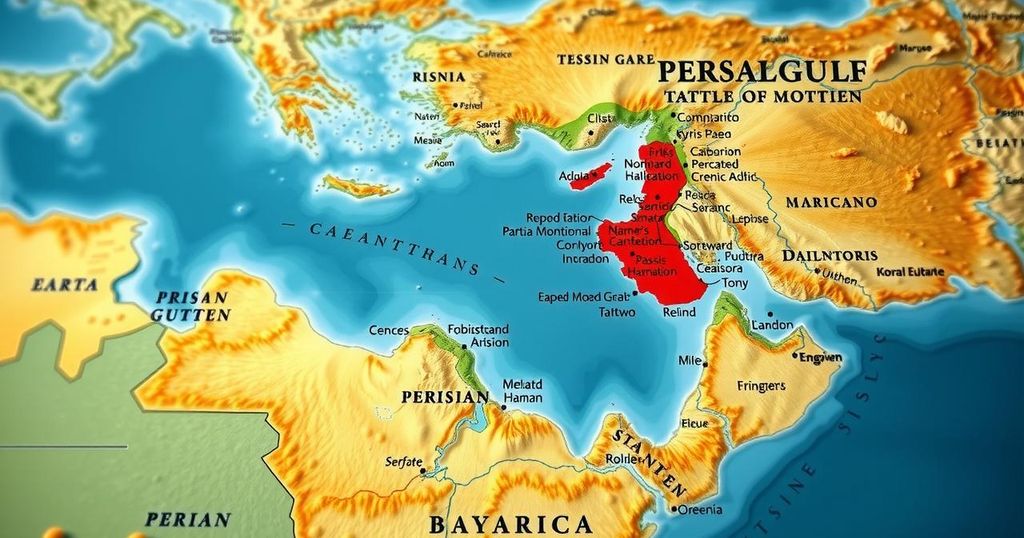Iran References 19th Century British Maps in Islands Ownership Dispute

Iran has cited 19th-century British maps in its ownership dispute over three islands with the UAE, heightening tensions amidst the UAE’s support from the EU and UN Security Council. The conflict centers on claims made since Britain’s colonial rule, complicating Iran’s diplomatic relations with Gulf states and the EU, while Iranian leaders assert their historical claims to the islands.
Iran has invoked 19th-century British maps in its escalating dispute with Gulf states regarding the ownership of three strategically significant islands in the Strait of Hormuz. This contention risks undermining Iran’s pursuit of enhanced relations with its Gulf neighbors and complicates its efforts in strengthening ties with the European Union. A joint statement from the EU, which specifically condemned Iran’s claimed ‘occupation’ of the islands, has fueled Iranian efforts to assert historical claims based on a 1888 map drafted by the British War Office, indicating that the islands were considered Iranian territory at that time. The ownership debate over the islands — Abu Musa, Greater Tunb, and Lesser Tunb — has persisted for over 50 years and is particularly sensitive in Iran. Following the joint statement from the EU-Gulf Cooperation Council, which considered the situation a violation of the United Arab Emirates’ sovereignty, Iranian officials have revitalized their claims by referring to historical documents. The islands are viewed as pivotal for navigation and military strategy, particularly given their location at the entrance of the vital strait of Hormuz, which is essential for oil transportation. The emirate of Sharjah claims Abu Musa while Ras al-Khaimah asserts rights over the other two islands. This situation traces back to British colonial involvement, where the islands were occupied in 1908, but their protectorate status was relinquished in 1971 during Britain’s withdrawal from the region. Subsequently, Iran forcibly took control of the Tunbs but negotiated a joint administration for Abu Musa with Sharjah, a arrangement which Iran later disregarded when it expelled Emirati residents in 1992. The UAE has sought arbitration through international legal bodies, but Iran’s refusal of third-party intervention has stalled these efforts. Despite its challenges, the UAE has garnered support from the five permanent members of the UN Security Council against Iran. Iranian representatives, meanwhile, have cited historical maps presented to the Persian monarchy to bolster their claims, while the UAE argues that the islands historically belonged to the Qasimi dynasty. The EU’s endorsement of the UAE’s position has led to significant unrest within Iranian political circles. Some Iranian leaders, such as Foreign Minister Abbas Araghchi, have condemned European interference, asserting that the islands will always remain Iranian. On the other hand, the speaker of the Iranian parliament adopted a confrontational tone, stating that the Gulf Cooperation Council should focus on regional stability rather than making unfounded territorial claims against Iran.
The territorial dispute between Iran and the United Arab Emirates (UAE) over three strategically located islands—Abu Musa, Greater Tunb, and Lesser Tunb—has deep historical roots dating back to the era of British colonialism in the Middle East. The islands’ location at the entrance of the Strait of Hormuz, a critical maritime trade route, makes them significant not only from a geopolitical standpoint but also for their implications on energy security. The British occupation of the islands, followed by a complicated history involving claims of ownership and military control, has led to ongoing tensions, especially amidst contemporary efforts by Iran to build alliances in the region.
In conclusion, the dispute over the ownership of the three islands remains a critical issue between Iran and the Gulf states, particularly the UAE. The invocation of historical maps by Iran highlights its emphasis on sovereignty claims while also illustrating the broader geopolitical dynamics at play, especially in relation to its aspirations for strengthened ties with both regional partners and the European Union. The situation embodies the complexities of historical legacies, national pride, and the strategic importance of these territories in contemporary international relations.
Original Source: www.theguardian.com








